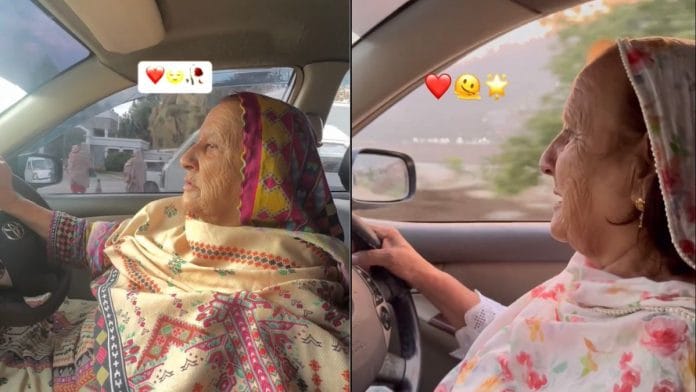New Delhi: Zahida Kazmi, Pakistan’s first female taxi driver, has captured the hearts of people on the internet after her son, content creator Majid Ali, shared a video of her driving a Toyota on the bustling streets of Abbottabad. The video, which has garnered nearly 20 million views, has left Pakistanis—and even Indians—charmed by the sight of a “cute dadi” behind the wheel. The clip has gone viral with some viewers even demanding that she show off her drifting skills as well.
One Instagram user @flowersandlovers commented, “While we are anxious about even driving cycles on the road, look at how confidently she’s navigating the streets.”
But this isn’t new for 75-year-old Kazmi.
Her journey behind the wheel began in 1992, but it wasn’t born out of ambition alone—it was a necessity. Married at the age of 13, Kazmi moved from Abbottabad to Karachi in 1972. She became a widow in her 20s and was forced to face a future alone with her children.
Kazmi defied convention in 1987 when a government employment scheme allowed her to buy a yellow cab with easy instalments. She took to the streets of Karachi to become Pakistan’s first female taxi driver, navigating through the conservative societal climate of General Zia-ul-Haq’s regime.
“I saw that there were women in every profession but there were no taxi drivers”, she said in a 2021 interview.
Kazmi’s late husband, who was also a taxi driver, had taught her to drive, laying the foundation for her courage to step into a traditionally male-dominated profession.
The initial years of her career as a female taxi driver were fraught with challenges. In a male-dominated world, Kazmi often had to travel with a burqa for protection and even carried a gun to safeguard herself and her passengers. But despite the threats and the fear, Kazmi grew resilient. Over time, her nervousness gave way to a fearless attitude, determination, and street-smart wisdom.
Also read: ISPR to get PKR 2 bn to fight fake news. Pakistanis call Army wing factory of misinformation
The legend of Rawalpindi
Her journey wasn’t without its hurdles. Now a legend in Rawalpindi, Kazmi still drives her taxi across the city, from the chaotic markets of Islamabad to the more remote areas of Pakistan’s tribal regions. Despite her fame and recognition, the economic struggle continues.
While her achievements have earned her 36 awards, including a documentary by Seemab Gul that has been screened in 34 countries, Kazmi’s work is still far from easy.
As a woman behind the wheel, Kazmi faced prejudice, resistance, and even threats from extremist groups, such as the Taliban, who forbade her from driving into Swat. But Kazmi didn’t back down. She continued driving, undeterred by the risks, proving that no societal barrier could stop her from earning a livelihood for her family.
“The commander of Taliban once called me and said if we see you around Swat you won’t be alive. I said I have to earn money to feed my children so I will fight. I am scared of God, not of people”, Kazmi said in a 2015 interview.
Her son, Majid Ali, who is a popular travel blogger and content creator, frequently highlights Pakistan’s cultural heritage and landscapes on his social media platforms. His recent viral video of his mother driving has sparked a wave of admiration and inspired people from all walks of life.






